Charles E W Bean, Diaries, AWM38 3DRL 606/257/1 - 1916 - 1927 - Part 9
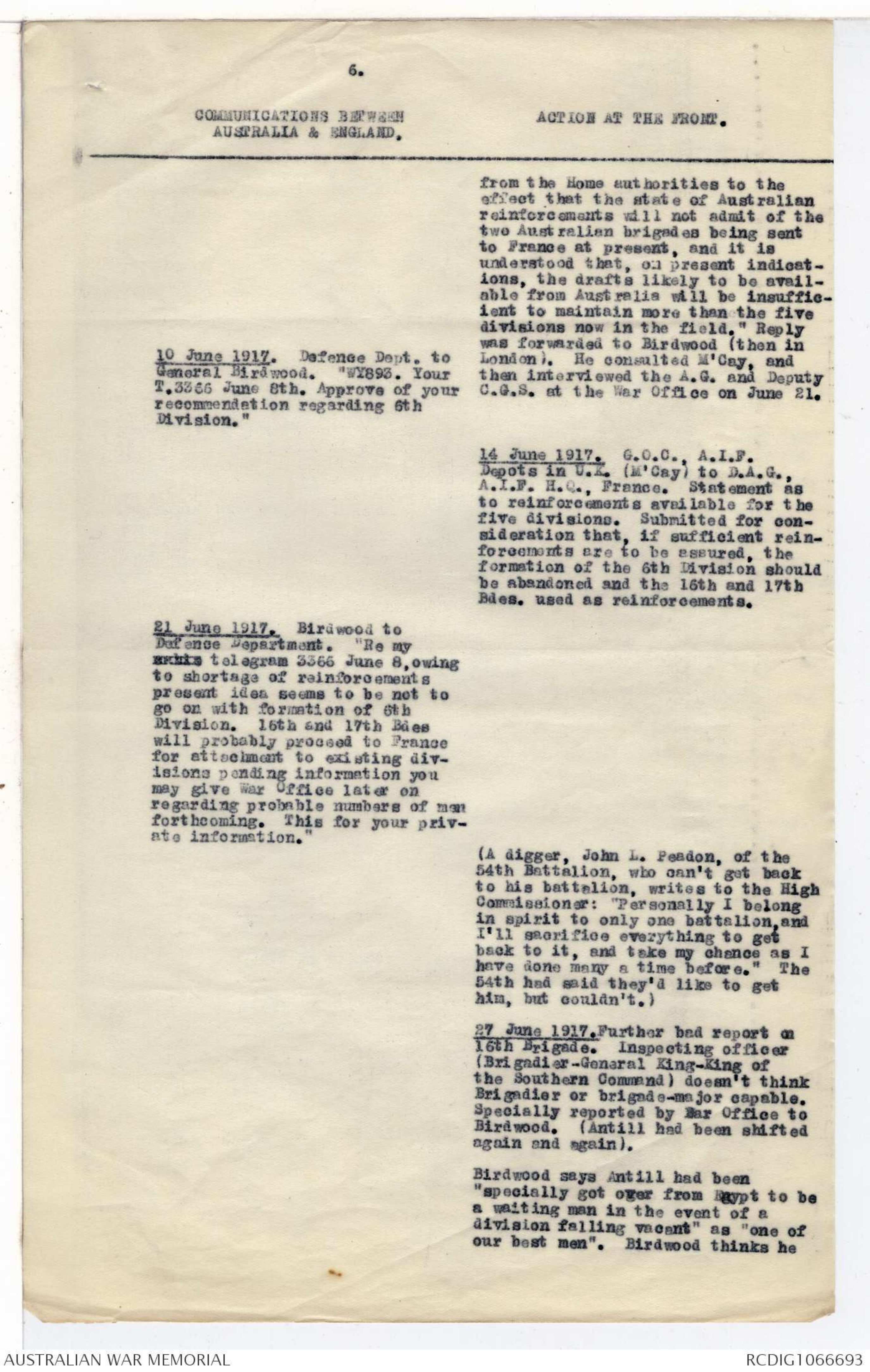
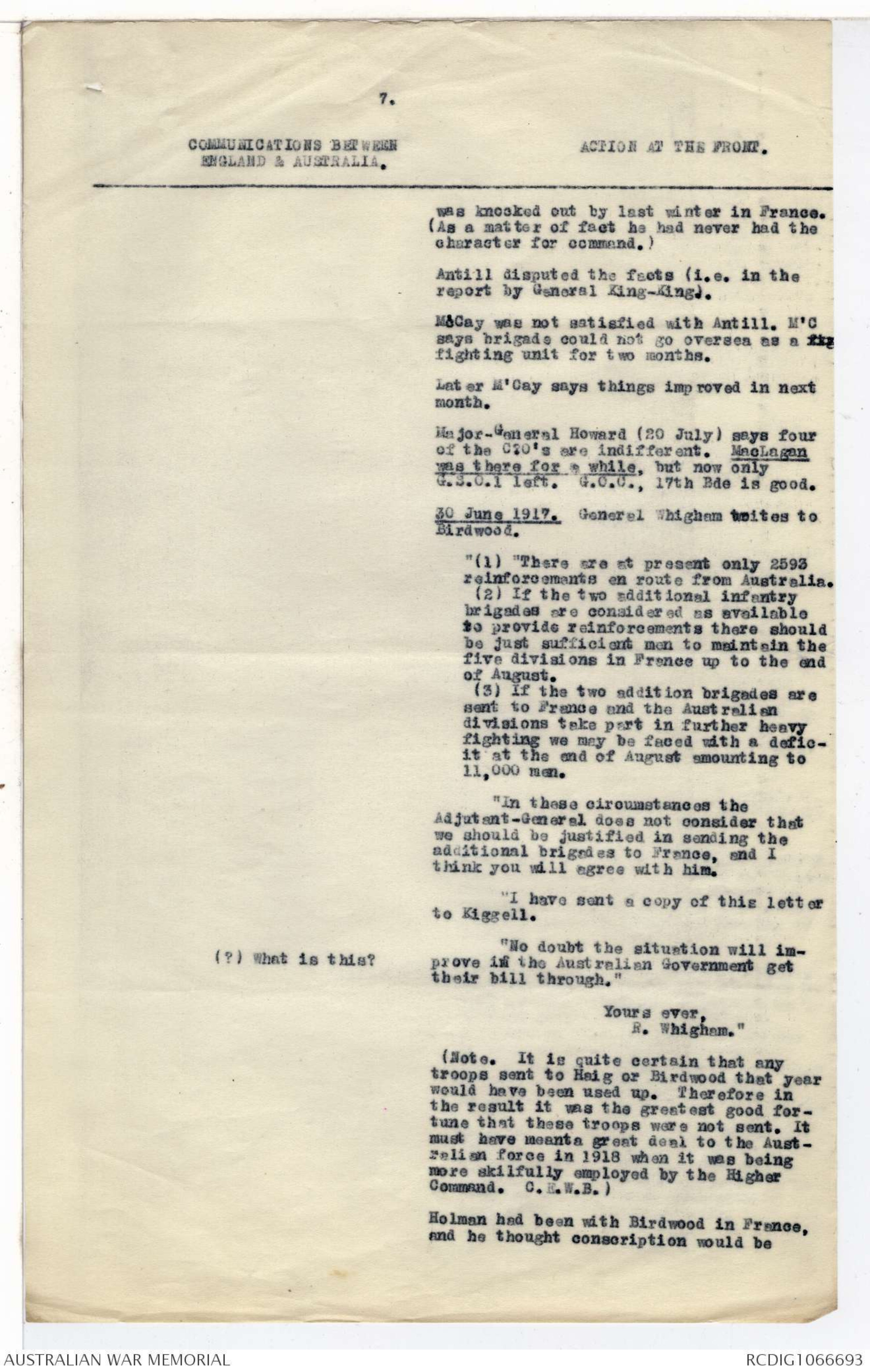
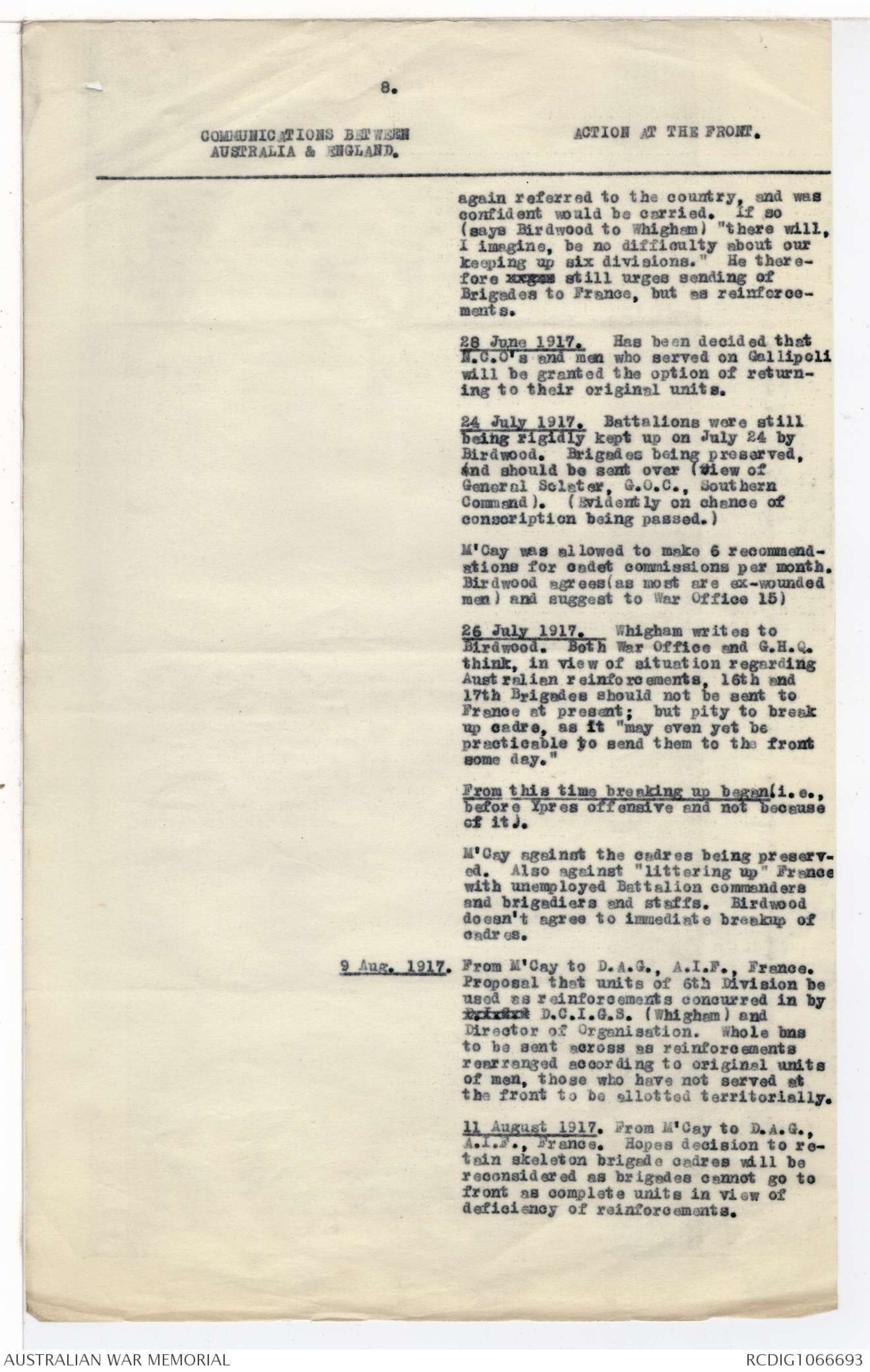
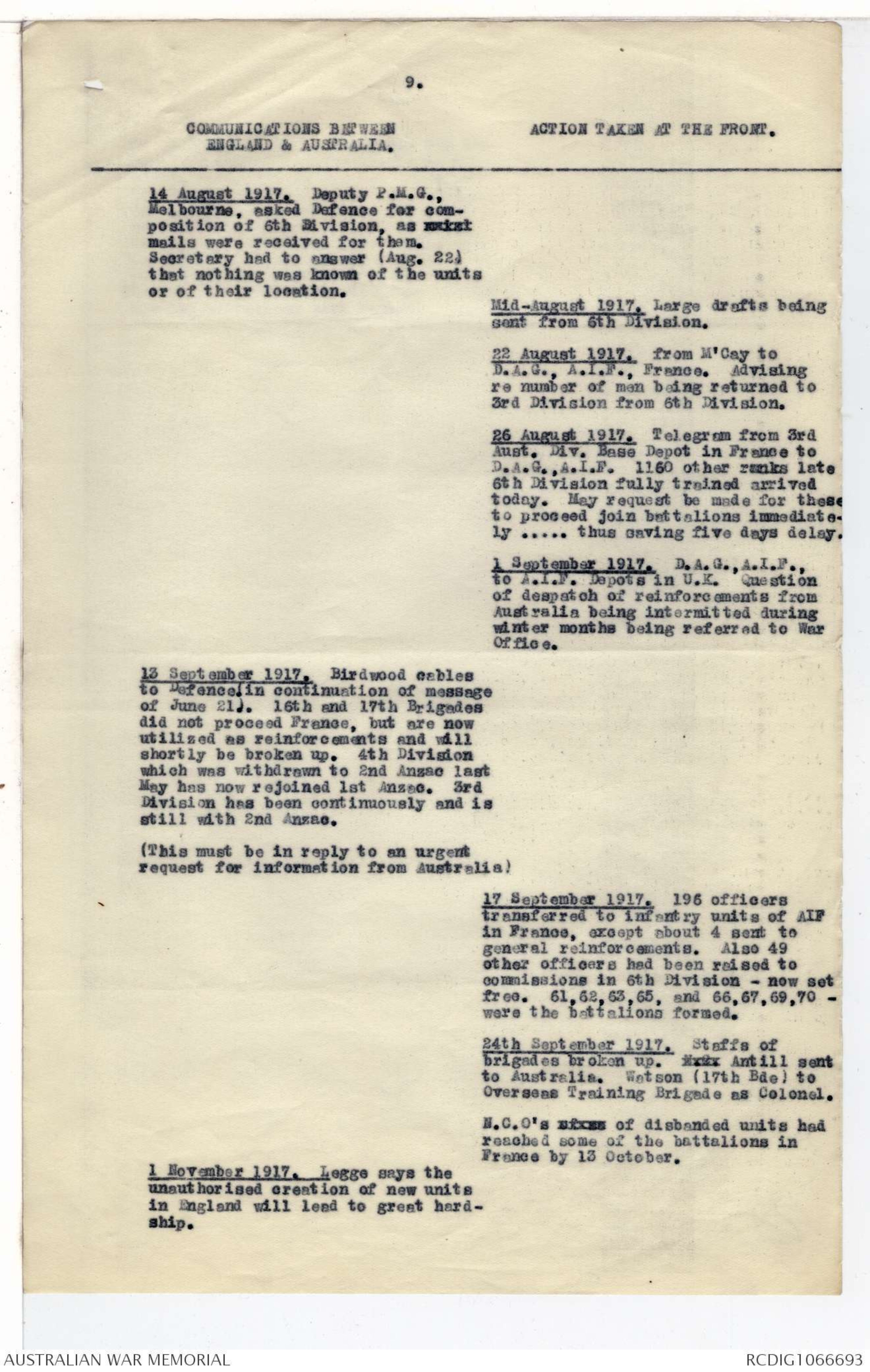
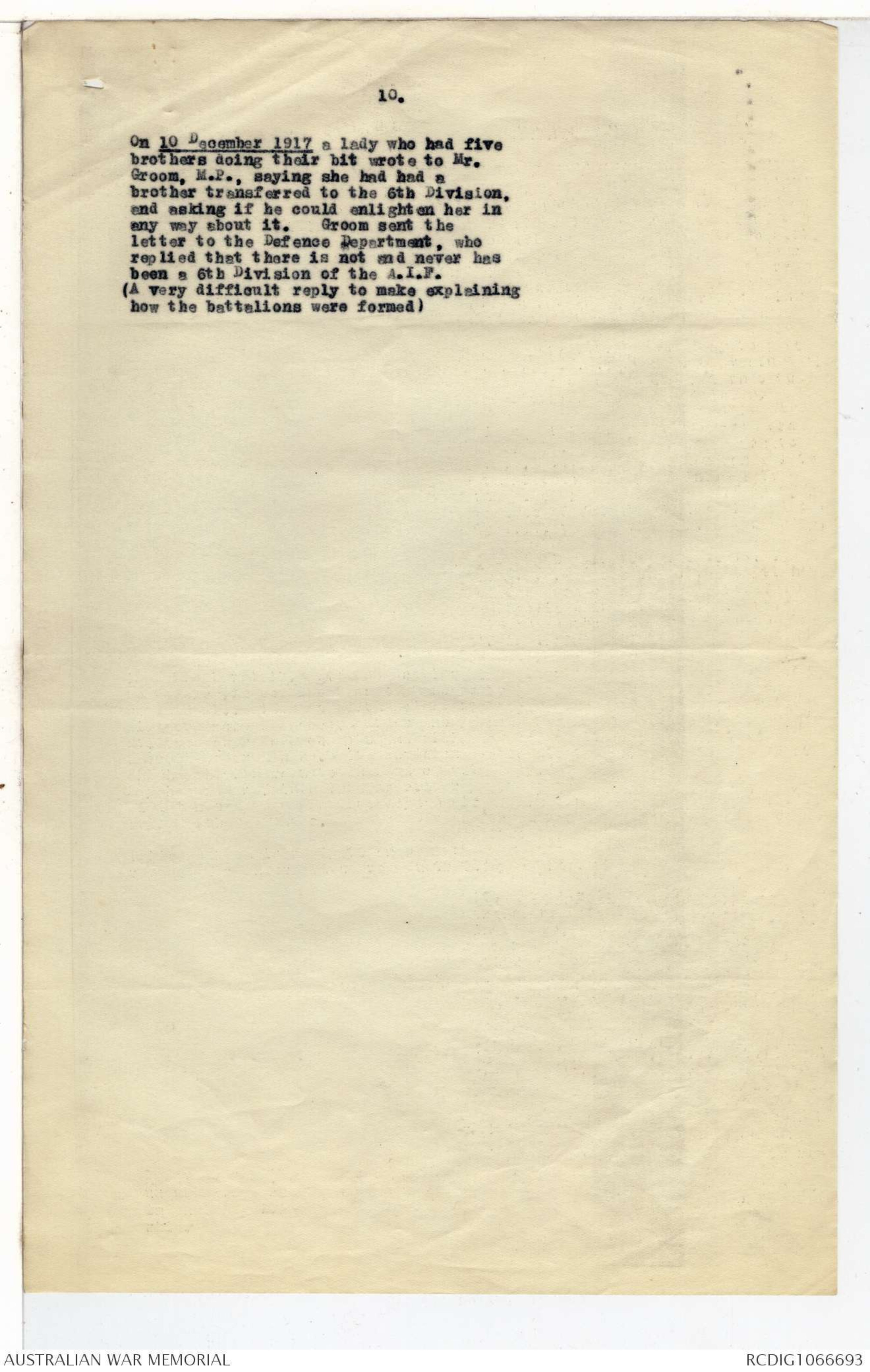
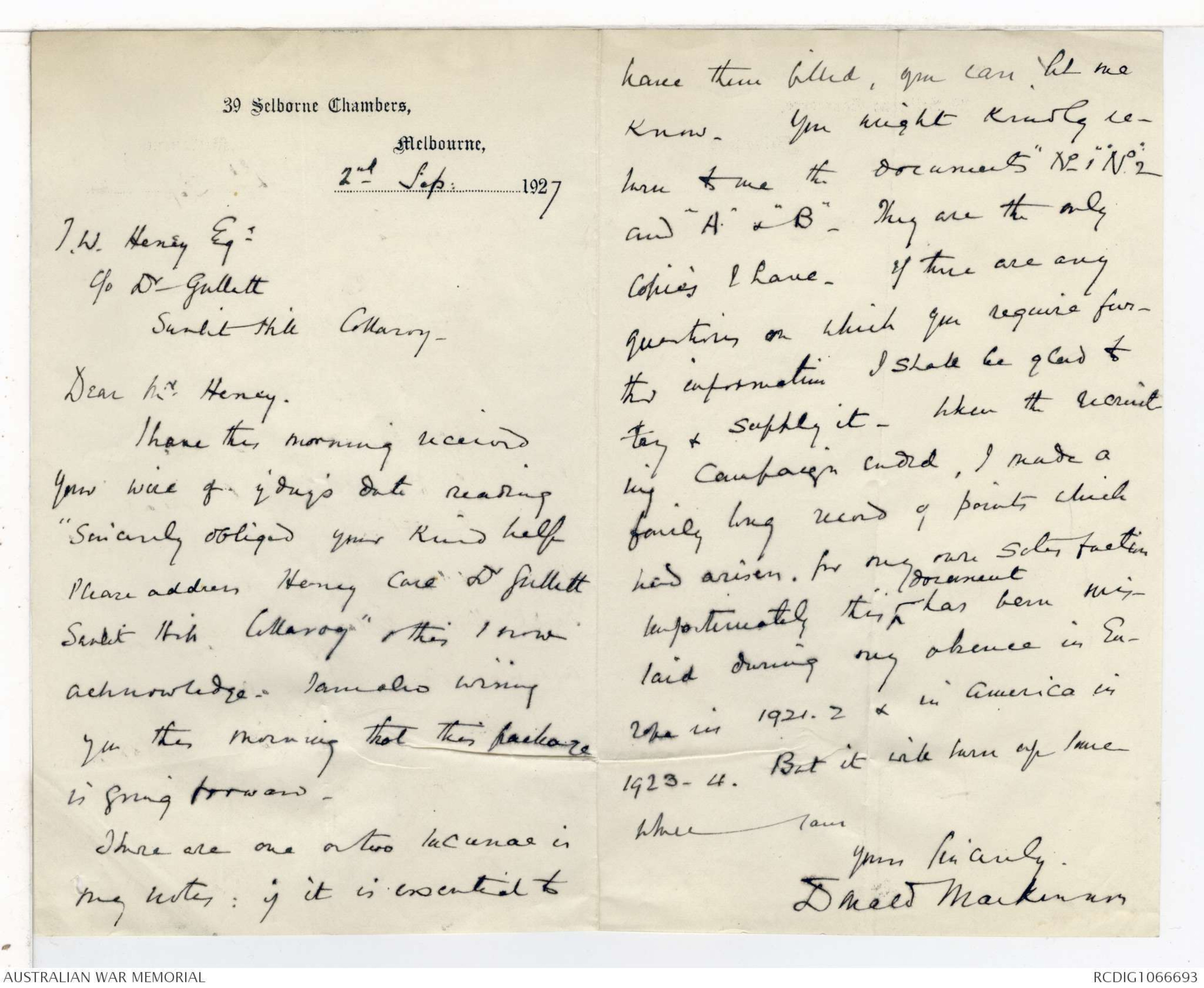
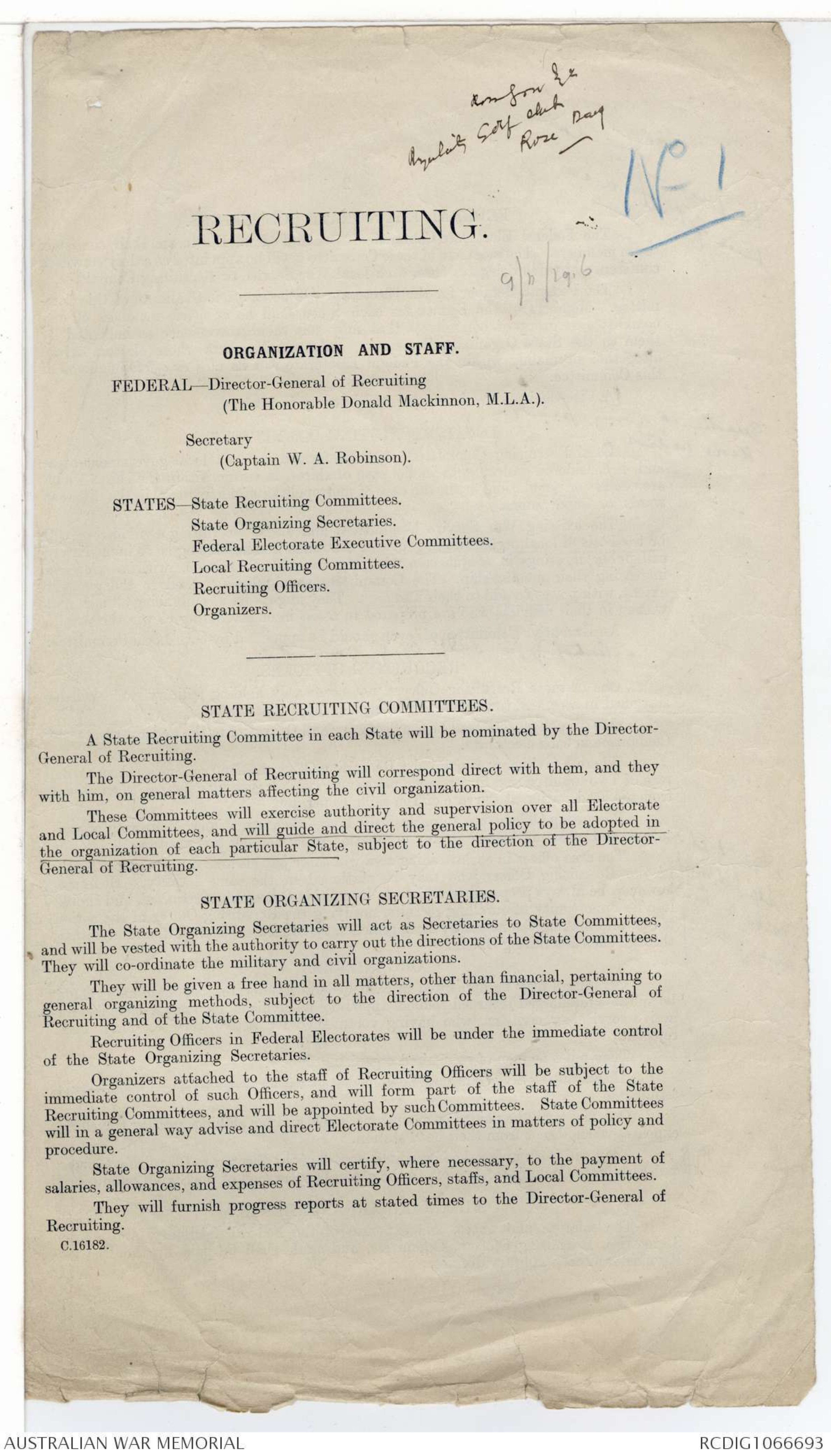
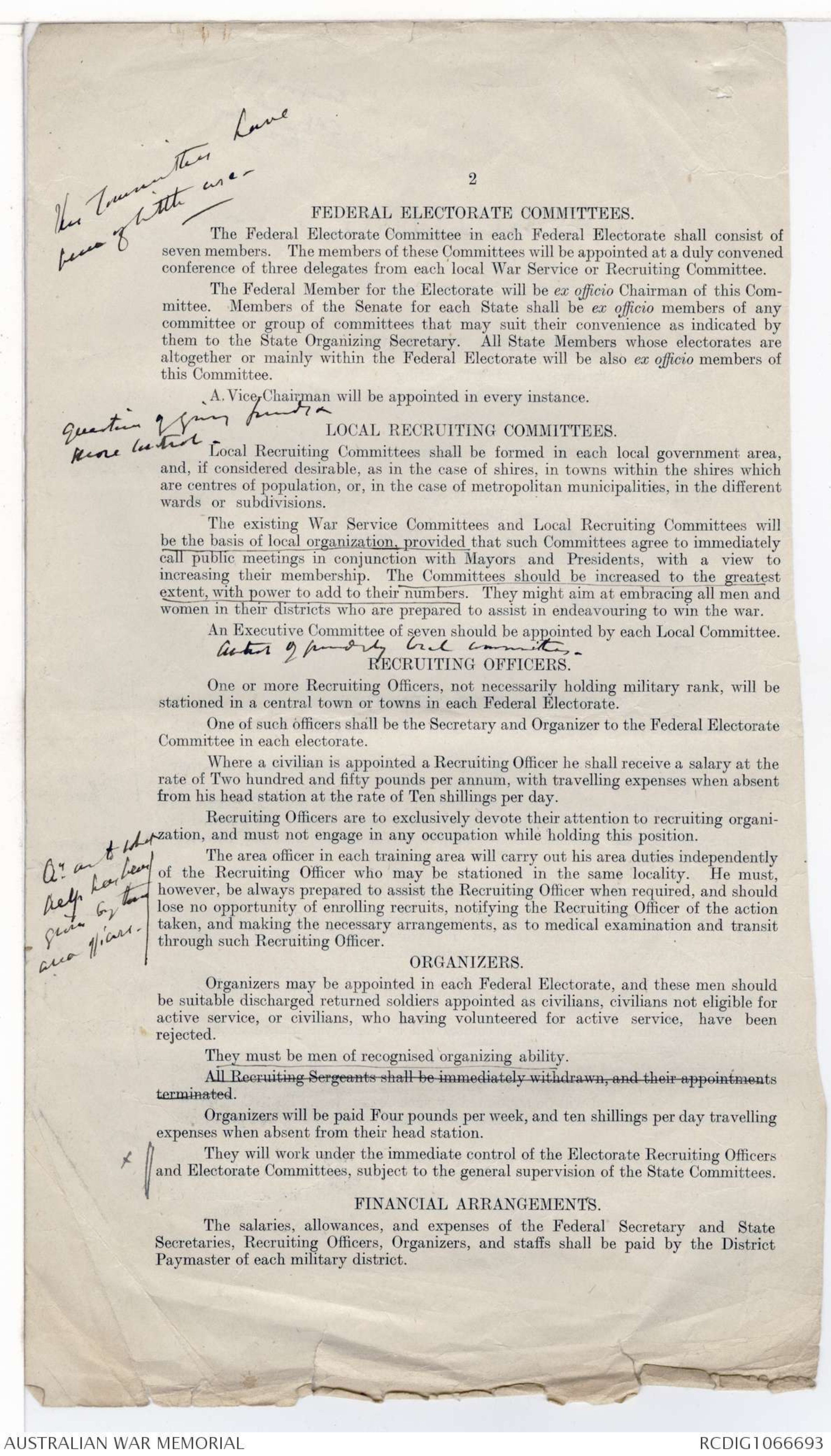
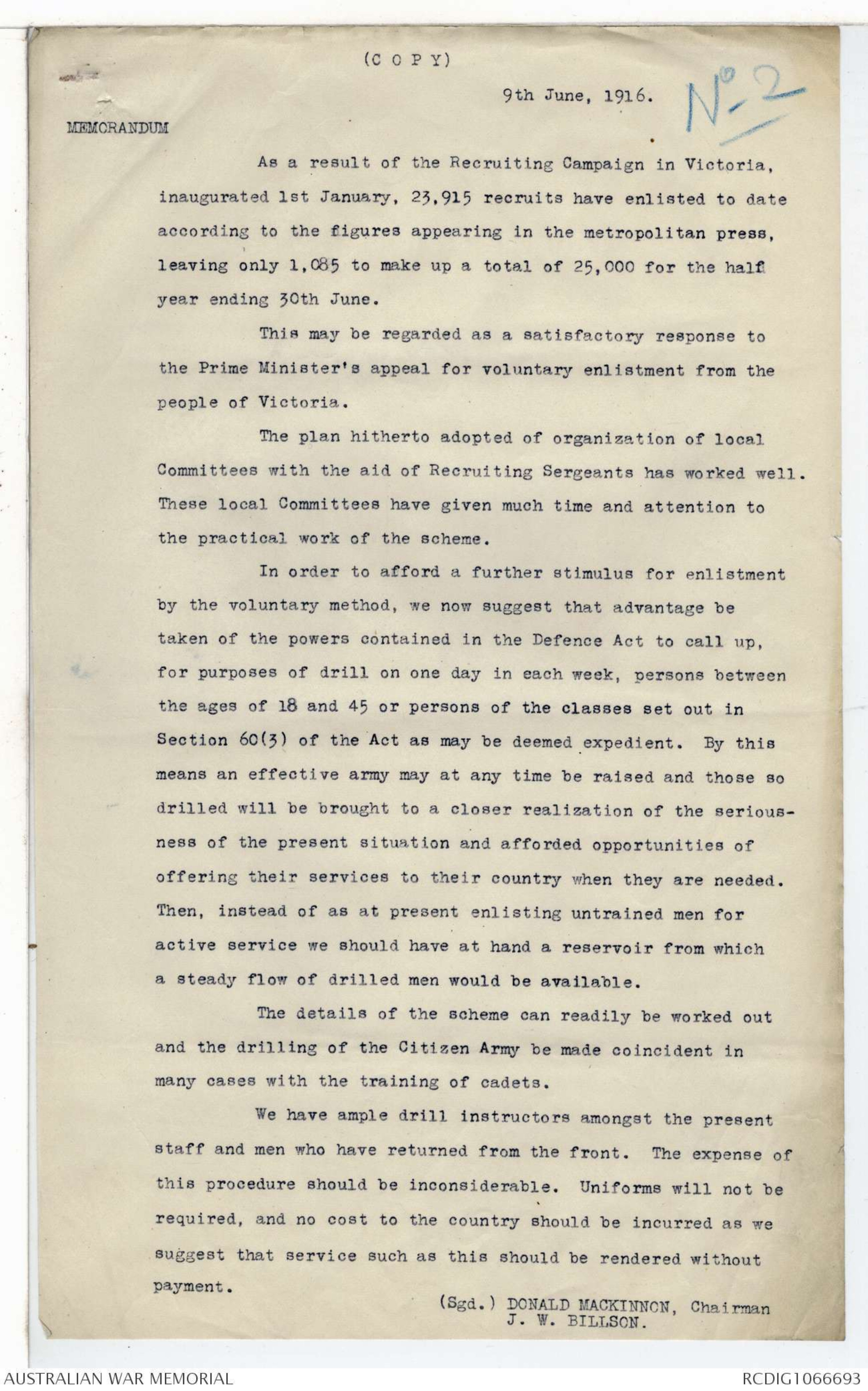
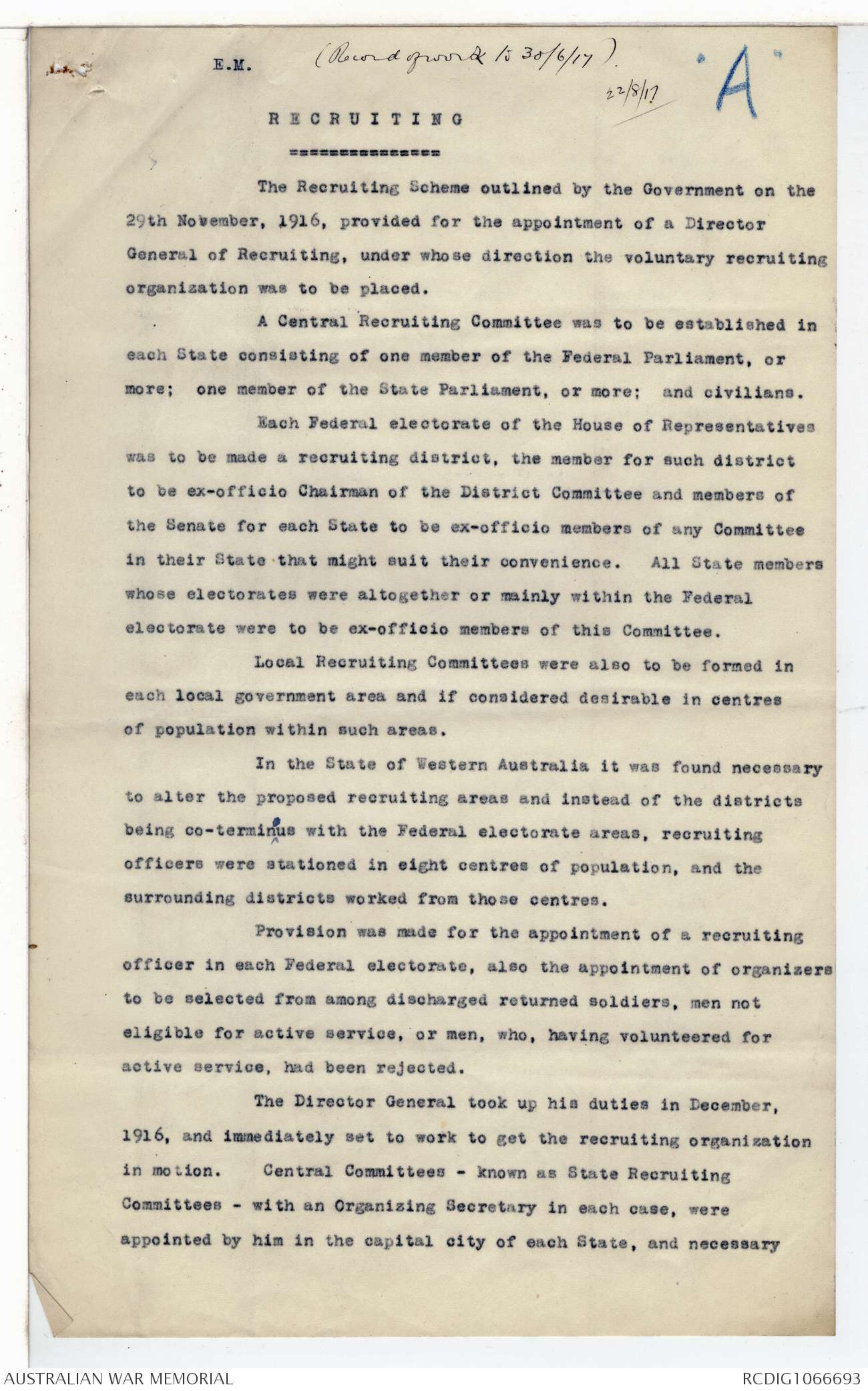
6.
|
COMMUNICATIONS BETWEEN |
ACTION AT THE FRONT |
|
from the Home authorities to the the drafts likely to be available from Australia will be insufficient to maintain more than the five |
|
| 10 June 1917. Defence Dept. to General Birdwood. "WY893. Your T.3366 June 8th. Approve of your recommendation regarding 6th Division." |
|
|
14 June 1917. G.O.C. A.I.F. that, if sufficient reinforcements are to be assured, the |
|
|
21 June 1917. Birdwood to pending information you information. |
|
| (A digger, John L. Peadon, of the 54th Battalion, who can't get back to his battalion, writes to the High Commissioner: "Personally I belong in spirit to only one battalion, and I'll sacrifice everything to get back to it, and take my chance as I have done many a time before." The 54th had said they'd like to get him, but couldn't.) 27 June 1917.Further bad report on 16th Brigade. Inspecting officer (Brigadier-General King-King of the Southern Command) doesn't think Brigadier or brigade-major capable. Specially reported by Bar Office to Birdwood. (Antill had been shifted again and again). Birdwood says Antill had been "specially got over from Egypt to be a waiting man in the event of a division falling vacant" as "one of our best men". Birdwood thinks he |
7.
|
COMMUNICATIONS BETWEEN |
ACTION AT THE FRONT |
|
was knocked out by last winter in France. was there for a while, but now only "(1) "There are at present only 2593 at the end of August amounting to |
|
|
(?) What is this?
|
"No doubt the situation will improve if the Australian Government get (Note. It is quite certain that any that these troops were not sent. It force in 1918 when it was being |
8.
|
COMMUNICATIONS BETWEEN |
ACTION AT THE FRONT |
|
again referred to the country, and was still urges sending of to their original units. for cadet commissions per month. Also against "littering up" France |
|
|
9 Aug. 1917.
|
From M'Cay to D.A.G., A.I.F., France. skeleton brigade cadres will be |
9.
|
COMMUNICATIONS BETWEEN |
ACTION AT THE FRONT |
|
14 August 1917. Deputy P.M.G., of 6th Division, as |
|
|
Mid-August 1917. Large drafts being ..... thus saving five days delay. |
|
| 13 September 1917. Birdwood cables to Defence(in continuation of message of June 21). 16th and 17th Brigades did not proceed France, but are now utilized as reinforcements and will shortly be broken up. 4th Division which was withdrawn to 2nd Anzac last May has now rejoined 1st Anzac. 3rd Division has been continuously and is still with 2nd Anzac. (This must be in reply to an urgent request for information from Australia) |
|
| 7 September 1917. 196 officers transferred to infantry units of AIF in France, except about 4 sent to general reinforcements. Also 49 other officers had been raised to commissions in 6th Division - now set free. 61,62,63,65, and 66,67,69,70 - were the battalions formed. 24th September 1917. Staffs of brigades broken up. to Australia. Watson (17th Bde) to Overseas Training Brigade as Colonel. N.C.O's reached some of the battalions in France by 13 October. |
|
| 1 November 1917. Legge says the unauthorised creation of new units in England will lead to great hardship. |
10.
On 10 December 1917 a lady who had five
brothers doing their bit wrote to Mr.
Groom, M.P., saying she had had a
brother transferred to the 6th Division,
and asking if he could enlighten her in
any way about it. Groom sent the
letter to the Defence Department, who
replied that there is not and never has
been a 6th Division of the A.I.F.
(A very difficult reply to make explaining
how the battalions were formed)
39 Selborne Chambers,
Melbourne,
2nd Sep. 1927
T.W. Henry Esq.
C/o Dr Gullett
Sanlit Hill {/}arog
Dear Mr Henry.
I hope this morning received
you were of y' day's out reading
"Sincerely obliged your kind help
Please address Henry Care Dr Gullett
Sanlit Hill C[?] & this I now
acknowledge. I am also writing
you this morning that the package
is going tomorrow.
There are one or two [?] is
my notes : if it is [?] to
have them billed, you can . let me
know. You might kindly return
to me the documents " No1" "No2"
and "A" & "B". They are the only
copies I have. If there are any
questions on which you require further
information I shall be glad to
try & supply it. When the recruiting
campaign could, I made a
fairly long [?] of points which
had arisen. for my sake solely facti[?]
unfortunately this document has been mislaid
during my absence in Europe
in 1921.2 & in America in
1923-4. But it [?] turn up some
where I am
yours Sincerely.
Donald Mackinnon
[* [?] [?]
[?] [?] [?]
Rose Bay
No 1
09/11/1916*]
RECRUITING.
—————————
ORGANIZATION AND STAFF.
FEDERAL--Director-General of Recruiting
(The Honourable Donald Mackinnon, M.L.A.)
Secretary
(Captain W. A. Robinson).
STATES —State Recruiting Committees.
State Organizing Secretaries.
Federal Electorate Executive Committees.
Local Recruiting Committees.
Recruiting Officers.
Organizers.
—————————
STATE RECRUITING COMMITTEES.
A State Recruiting Committee in each State will be nominated by the Director
General of Recruiting.
The Director-General of Recruiting will correspond direct with them, and they
with him, on general matters affecting the civil organization.
These Committees will exercise authority and supervision over all Electorate
and Local Committees, and will guide and direct the general policy to be adopted in
the organization of each particular State, subject to the direction of the Director-
General of Recruiting.
STATE ORGANIZING SECRETARIES.
The State Organizing Secretaries will act as Secretaries to State Committees,
and will be vested with the authority to carry out the directions of the State Committees.
They will co-ordinate the military and civil organizations.
They will be given a free hand in all matters, other than financial, pertaining to
general organizing methods, subject to the direction of the Director-General of
Recruiting and of the State Committee.
Recruiting Officers in Federal Electorates will be under the immediate control
of the State Organizing Secretaries.
Organizers attached to the staff of Recruiting Officers will be subject to the
immediate control of such Officers, and will form part of the staff of the State
Recruiting Committees, and will be appointed by such Committees. State Committees
will in a general way advise and direct Electorate Committees in matters of policy and
procedure.
State Organizing Secretaries will certify, where necessary, to the payment of
salaries, allowances, and expenses of Recruiting Officers, staffs, and Local Committees.
They will furnish progress reports at stated times to the Director-General of
Recruiting.
C.16182.
[* These Committees have
been of little use*]
2.
FEDERAL ELECTORATE COMMITTEES.
The Federal Electorate Committee in each Federal Electorate shall consist of
seven members. The members of these Committees will be appointed at a duly convened
conference of three delegates from each local War Service or Recruiting Committee.
The Federal Member for the Electorate will be ex officio Chairman of this Committee.
Members of the Senate for each State shall be ex officio members of any
committee or group of committees that may suit their convenience as indicated by
them to the State Organizing Secretary. All State Members whose electorates are
altogether or mainly within the Federal Electorate will be also ex officio members of
this Committee.
A. Vice-Chairman will be appointed in every instance.
[* Question of giving funds &
more control*]
LOCAL RECRUITING COMMITTEES.
Local Recruiting Committees shall be formed in each local government area,
and, if considered desirable, as in the case of shires, in towns within the shires which
are centres of population, or, in the case of metropolitan municipalities, in the different
wards or subdivisions.
The existing War Service Committees and Local Recruiting Committees will
be the basis of local organization, provided that such Committees agree to immediately
call public meetings in conjunction with Mayors and Presidents, with a view to
increasing their membership. The Committees should be increased to the greatest
extent, with power to add to their numbers. They might aim at embracing all men and
women in their districts who are prepared to assist in endeavouring to win the war.
An Executive Committee of seven should be appointed by each Local Committee.
[?] of [?] local committees.
RECRUITING OFFICERS.
One or more Recruiting Officers, not necessarily holding military rank, will be
stationed in a central town or towns in each Federal Electorate.
One of such officers shall be the Secretary and Organizer to the Federal Electorate
Committee in each electorate.
Where a civilian is appointed a Recruiting Officer he shall receive a salary at the
rate of Two hundred and fifty pounds per annum, with travelling expenses when absent
from his head station at the rate of Ten shillings per day
Recruiting Officers are to exclusively devote their attention to recruiting organization
and must not engage in any occupation while holding this position.
[*Qn [?] to the
Dept h[?] been
given by their
area officers*]
The area officer in each training area will carry out his area duties independently
of the Recruiting Officer who may be stationed in the same locality. He must,
however, be always prepared to assist the Recruiting Officer when required, and should
lose no opportunity of enrolling recruits, notifying the Recruiting Officer of the action
taken, and making the necessary arrangements, as to medical examination and transit
through such Recruiting Officer.
ORGANIZERS.
Organizers may be appointed in each Federal Electorate, and these men should
be suitable discharged returned soldiers appointed as civilians, civilians not eligible for
active service, or civilians, who having volunteered for active service, have been
rejected.
They must be men of recognised organizing ability.All Recruiting Sergeants shall be immediately withdrawn and their appointmentsterminated.
Organizers will be paid Four pounds per week, and ten shillings per day travelling
expenses when absent from their head station.
[*X*]
They will work under the immediate control of the Electorate Recruiting Officers
and Electorate Committees, subject to the general supervision of the State Committees.
FINANCIAL ARRANGEMENTS.
The salaries, allowances, and expenses of the Federal Secretary and State
Secretaries, Recruiting Officers, Organizers, and staffs shall be paid by the District
Paymaster of each military district.
(COPY)
9th June, 1916.
[* No2*]
MEMORANDUM
As a result of the Recruiting Campaign in Victoria,
inaugurated 1st January, 23,915 recruits have enlisted to date
according to the figures appearing in the metropolitan press,
leaving only 1,085 to make up a total of 25,000 for the half
year ending 30th June.
This may be regarded as a satisfactory response to
the Prime Minister's appeal for voluntary enlistment from the
people of Victoria.
The plan hitherto adopted of organization of local
Committees with the aid of Recruiting Sergeants has worked well.
These local Committees have given much time and attention to
the practical work of the scheme.
In order to afford a further stimulus for enlistment
by the voluntary method, we now suggest that advantage be
taken of the powers contained in the Defence Act to call up,
for purposes of drill on one day in each week, persons between
the ages of 18 and 45 or persons of the classes set out in
Section 60(3) of the Act as may be deemed expedient. By this
means an effective army may at any time be raised and those so
drilled will be brought to a closer realization of the seriousness
of the present situation and afforded opportunities of
offering their services to their country when they are needed.
Then, instead of as at present enlisting untrained men for
active service we should have at hand a reservoir from which
a steady flow of drilled men would be available.
The details of the scheme can readily be worked out
and the drilling of the Citizen Army be made coincident in
many cases with the training of cadets.
We have ample drill instructors amongst the present
staff and men who have returned from the front. The expense of
this procedure should be inconsiderable. Uniforms will not be
required, and no cost to the country should be incurred as we
suggest that service such as this should be rendered without
payment.
(Sgd.) DONALD MACKINNCN, Chairman
J. W. BILLSON.
E.M.
(Record of work to 30/6/17)
22/8/17 "A"
RECRUITING
The Recruiting Scheme outlined by the Government on the
29th November, 1916, provided for the appointment of a Director
General of Recruiting, under whose direction the voluntary recruiting
organization was to be placed.
A Central Recruiting Committee was to be established in
each State consisting of one member of the Federal Parliament, or
more; one member of the State Parliament, or more; and civilians.
Each Federal electorate of the House of Representatives
was to be made a recruiting district, the member for such district
to be ex-officio Chairman of the District Committee and members of
the Senate for each State to be ex-officio members of any Committee
in their State that might suit their convenience. All State members
whose electorates were altogether or mainly within the Federal
electorate were to be ex-officio members of this Committee.
Local Recruiting Committees were also to be formed in
each local government area and if considered desirable in centres
of population within such areas.
In the State of Western Australia it was found necessary
to alter the proposed recruiting areas and instead of the districts
being co-terminous with the Federal electorate areas, recruiting
officers were stationed in eight centres of population, and the
surrounding districts worked from those centres.
Provision was made for the appointment of a recruiting
officer in each Federal electorate, also the appointment of organizers
to be selected from among discharged returned soldiers, men not
eligible for active service, or men, who, having volunteered for
active service, had been rejected.
The Director General took up his duties in December,
1916, and immediately set to work to get the recruiting organization
in motion. Central Committees - known as State Recruiting
Committees - with an Organizing Secretary in each case, were
appointed by him in the capital city of each State, and necessary
 Sam scott
Sam scottThis transcription item is now locked to you for editing. To release the lock either Save your changes or Cancel.
This lock will be automatically released after 60 minutes of inactivity.